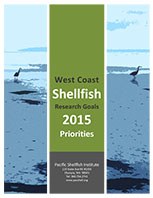About Us

Mission and History

Who We Are

Leadership

Strategic Plan

Work with Us

Contact Us

FEATURED |
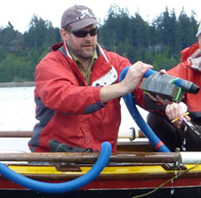
The man with a plan
PSI researcher, Andy Surhbier helps shellfish growers adapt to changing ocean conditions.
|
|
Who We Are
The Pacific Shellfish Institute staff are experienced researchers with a wide variety of professional and academic backgrounds.
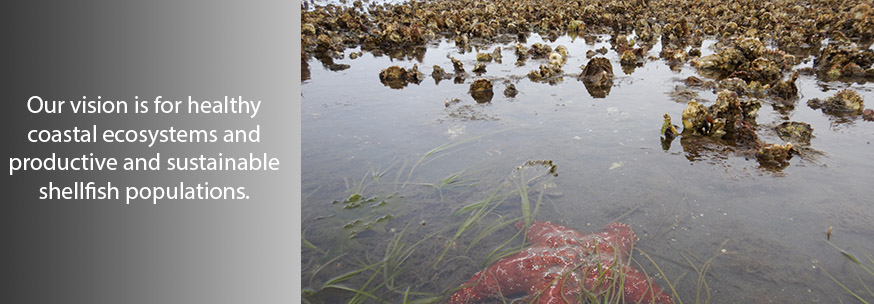
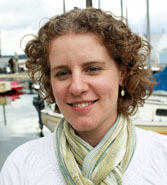 |
|
Bobbi Hudson, Executive Director
As Executive Director, Bobbi manages research studies and general operations of the Institute. Bobbi joined PSI in 2006 as a Research Biologist, contributing to applied research projects on the interactions of shellfish culture with the natural environment, organic pollutants, and disease and environmental stress. Her leadership role began with a multi-faceted project evaluating the benefits and costs of shellfish in Washington State, and a survey-based study of the economic contributions of the West Coast shellfish industry. In 2013 Bobbi transitioned to Executive Director, but continues to serve as a scientist for PSI's diverse portfolio of biological, oceanographic and social science research. Bobbi also specializes in evaluation of sustainable bivalve aquaculture production in near shore environments, and serves as an inspector for a 3rd party certification program.
Bobbi Hudson holds a B.S. and a M.S. in Environmental Science from The Evergreen State College. Her primary research interests include valuation of ecosystem services, social and ecological carrying capacity, and intertidal ecology. Bobbi serves on various state and regional working groups related to marine water quality and shellfish production, and the International Council for the Exploration of the Sea (ICES) Expert Working Group on Ecological Carrying Capacity in Aquaculture (WGECCA). Prior to joining PSI, Bobbi served as a fisheries technician with the U.S. Fish and Wildlife Service, and performed shellfish and finfish work aboard commercial vessels in Puget Sound and SE Alaska. Bobbi also spent three years as a public information officer for the state of Washington. Bobbi can usually be found on or near the water, and splits her time between Olympia, WA, SE Alaska, and Vancouver Island, BC. |
|
 |
|
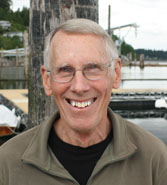 |
|
Dan Cheney, PhD, Senior Scientist
Dan Cheney specializes in aquaculture production systems, water quality analysis, environmental impact analysis and coastal resource management and inventories. He received a B.S. and Ph.D. in Fisheries from the University of Washington and a M.S. in Zoology from the University of Hawaii. Dan served as PSI's Executive Director from 1995 until late 2009, and remains as a retired senior scientist. He was the principal investigator and/or team partner for a wide range of research studies to examine the environmental interactions of shellfish production practices, assess methods to control Vibrio bacteria contamination and reduce the public health risk of raw shellfish, assess heavy metal concentrations in west coast shellfish and determine human health risks, and assist in modeling the shellfish contamination risks associated with stormwater, wildlife, and human interactions
Dan was also owner of BioAquatics International LLC (BAI) until 2019 and supported this company's fisheries and aquaculture; coastal permitting; economic, environmental and biological assessment and natural resources practice. Dan's consulting work involved field and laboratory studies, including diving and video surveys, investigative reviews and analyses, and descriptive reporting for clients in Washington State, and elsewhere in the U.S. and Canada, central and western Pacific islands, southeast Asia, Central America and the Middle-East. Dan has recently increasingly engaged in manuscript, project and proposal reviews for a number of international publications and research funders (USEPA, Sea Grant, Chilean government). |
|
 |
|
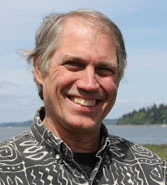 |
|
Steve Booth, PhD, Senior Scientist
Dr. Steve Booth specializes in integrated pest management. Steve received a Ph.D. in Entomology from Oregon State University, a M.S. in Biology from Western Washington University, and a B.S. in Zoology from the University of Iowa. Steve's Ph.D. program and a similar post-doctoral position in British Columbia involved the development and implementation of pest management programs that selectively targeted pests on pears, but allowed for the immigration and development of indigenous arthropod natural enemies. Prior to joining PSI, Steve worked for Washington State University, at the Vancouver Research Unit, examining the potential of microbial agents to suppress insect pests on small fruit. This work included the development of methods to isolate, formulate and produce entomopathogenic fungi.
Steve is currently involved in research to examine physical, chemical, and biological control options for burrowing shrimp on commercial oyster beds in southwest Washington State. This is a unique problem involving application of a pesticide against an indigenous pest in an estuary. Steve is also involved in similar research into potential impacts and control tactics for Japanese eelgrass (Z. japonica), which is listed as a class C noxious weed in Washington and is being actively eradicated in California. Steve is also the primary author on the recently released 'Illustrated Guide to Bivalve Pests in Washington and Oregon.' |
|
 |
|
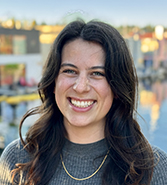 |
|
Fiona Boardman, PhD, Senior Scientist
Dr. Fiona Boardman is an intertidal ecologist who received her B.S. and Ph.D. in Biology from the University of Washington. Her graduate research, completed in collaboration with PSI and local shellfish growers, studied the effects of oyster aquaculture on intertidal communities, including seagrass, shorebirds, fish and invertebrates.
She is interested in research that falls at the intersection of sustainable food production and supporting ecosystem function, as well as research that informs environmental management practices. She is skilled in working with complex ecological datasets, including carrying out multivariate and community analyses. She enjoys problem-solving, and is passionate about improving and protecting the function of coastal ecosystems for the organisms that depend on them, including humans who work and live in these systems.
Fiona served as the Co-Chair of the National Shellfisheries Association student chapter from 2022-2024. She has shared her research at numerous national conferences and has published her work in peer-reviewed scientific journals. In her spare time, Fiona enjoys creating ecosystem-inspired aquariums, and spending time with her horse, dog, cat and family. |
|
 |
|
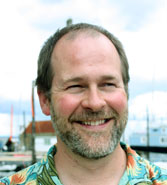 |
|
Andy Suhrbier, Senior Biologist
Andy Suhrbier holds a B.S. in Molecular Biology from Texas Lutheran University. Andy is involved in marine benthic and water quality sampling and analysis, mapping of marine habitats, data analysis, and project development and coordination. His current research includes examinations into the interactions of shellfish culture with the natural environment, shellfish disease and environmental stress studies, and monitoring and adaptation efforts related to ocean acidification.
Andy is experienced with the maintenance, deployment, and retrieval of a Sontek current meter, ISCO water samplers, YSI multiparameter dataloggers, Onset dataloggers and PSI developed dataloggers.
Prior to his work at PSI, Andy conducted creel surveys for the Oregon Department of Fish and Wildlife and served as a fishery observer in the Bering Sea and Gulf of Alaska for the National Marine Fisheries Service. |
|
 |
|
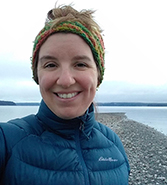 |
|
Katie Houle, Senior Biologist
Katie Houle holds a M.S. in Biology from Humboldt State University and a B.S. in Environmental Science from McGill University. She studies the nearshore environment focusing on the interaction of shellfish aquaculture with the surrounding ecosystem. She specializes in invertebrate biology, intertidal ecology, water quality and remote sensing. She conducts field and lab research, data analysis and project management for a variety of ongoing studies with PSI. She is currently leading PSI's efforts with the Regional Eelgrass/Oyster Consortium, working with collaborating scientists to assess native eelgrass community response to shellfish culture practices in WA, OR and CA. She is a member of the Pacific Northwest Crab Research Group and co-leads annual light trap monitoring for larval Dungeness crab in South Puget Sound with collaborating biologists. Katie holds certificates in GIS and Remote Sensing from Eastern Washington University and a current Remote Pilot License to operate drones. She collects high resolution drone imagery of shellfish farms and surrounding habitat to assist with sustainable production and management needs.
Prior to joining PSI, Katie studied marine invertebrate communities in coastal estuaries and rocky intertidal ecosystems in Northern California with Humboldt State University, CA Sea Grant, UC Davis Bodega Marine Lab and Acadia National Park. She also enjoyed teaching K-8 students at South Slough National Estuarine Research Reserve in coastal Oregon and The Ecology School in Saco, Maine. |
 |
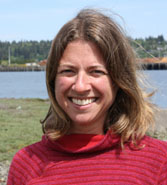 |
|
Aimee Christy, Research Biologist
Aimee Christy holds a B.S. in Zoology from the University of Washington and a M.S. in Environmental Science from The Evergreen State College. Aimee has over 15 years of experience in water quality analysis, wetland and estuarine studies, and invertebrate and algae surveys. Her interests include stormwater management and researching the impacts of land use change on water quality, particularly in shellfish growing areas. She is involved in PSI's research related to oyster mortality, cadmium concentrations in oysters, and harmful algal blooms. She also conducts phytoplankton analysis for species composition and abundance throughout the coast and Puget Sound, and public outreach and education related to pet waste and bacterial contamination.
Prior to her work with PSI, Aimee assisted development of a literature review on the impacts of urbanization on shellfish growing areas in Puget Sound. She also conducted aerial, boat and ground surveys to determine population and catch per unit effort estimates of recreational shellfish throughout Puget Sound for the Shellfish Management Program at Washington Department of Fish and Wildlife. Prior to that, Aimee was employed by the University of Washington to conduct intertidal invertebrate and algae surveys along the Olympic National Park coastline. |
|
 |
|
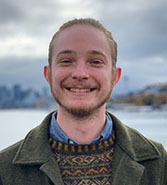 |
|
Kalloway Page, Research Biologist
Kalloway holds a Master of Marine Affairs (M.M.A.) and a B.S. in Oceanography and Aquatic and Fishery Sciences from the University of Washington. An ecologist at heart, his interests lie in applied research at the corner of sustainable marine resource use, and restoration and resiliency within coastal ecosystems. This includes eelgrass interactions with shellfish activities along the west coast, community response to anthropogenic habitat alterations in the nearshore, and the emergence of kelp as a new sustainable way for growers to diversify production. At PSI he works on a variety of projects that involve conducting field research, data analysis and database upkeep, technical writing, and project coordination with co-PIs. Currently, he is assisting the PSI lead with the regional eelgrass and oyster fieldwork and data analysis, and integrating PSI’s Ocean Acidification data into a larger, more accessible network.
Prior to his work at PSI, Kalloway worked as a consulting biologist in Seattle supervising the collection of geoduck biomass estimates and working with the Tribes and Washington state agencies to sustainably co-manage the fishery. He also previously contracted as a Marine Mammal Monitor ensuring marine construction activities followed protocols in accordance with the Endangered Species Act and the Marine Mammal Protection Act.
|
|
 |
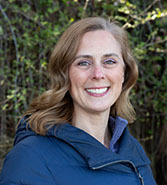 |
|
Shannon Boldt, Research Biologist
Shannon holds a B.S. in Biology from Pacific Lutheran University and a Master’s in Environmental Policy and Management, with Fish and Wildlife Management concentration from American Military University. Her deep-seated love of saltwater and the life it supports, motivated her to make a change– shifting from past work in clinical laboratory research to a focus on the marine environment. She is especially interested in monitoring and management of marine organisms, and conservation of Puget Sound as a vibrant and robust ecosystem.
In her quest to learn, she has dedicated the last few years to participating in forage fish and Pigeon Guillemot surveys, as well as larval Dungeness crab monitoring in the South Sound. She has also dabbled as a seasonal Science Technician, contributing to eelgrass and clam studies at PSI and held the roles of science intern, communications lead, and board member at the Nisqually Reach Nature Center. At PSI, she plans to continue balancing opportunities to work on shellfish and eelgrass interaction studies in the field and lab (get her hands dirty!), as well as lend assistance with literature reviews, updates, and report writing.
In addition to her position at PSI, Shannon currently serves as the Pigeon Guillemot Breeding Survey Coordinator for the Salish Sea Guillemot Network, where she coordinates regional efforts to gather data on this beloved Puget Sound indicator species. In her spare time, she enjoys being outside and on the water, walking, hiking, traveling, and capturing wildlife through the lens of her camera.
|
|
 |
|
|
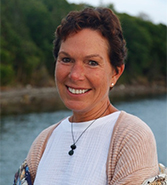 |
|
Katharine (Trina) Wellman, PhD, Natural Resource Economist
Trina holds a Ph.D. in Natural Resource Economics and an M.M.A. in Marine Policy, both from the University of Washington, Seattle. She has worked at the Woods Hole Oceanographic Institution, the National Oceanic and Atmospheric Administration and Battelle Memorial Institute, and most recently at Northern Economics Inc. as a research scientist and environmental economist. She also served on the Puget Sound Partnership Science Panel and Southern Killer Whale Recovery Task Force for the State of Washington. Katharine was formerly president of the board of Salish Seas Expedition (a boat based experiential program that provides marine science education to middle and high school students) and on the science advisory board of the SeaDoc Society on Orcas Island, Washington. Katharine currently serves on the board of directors of the Northwest Maritime Center in Port Townsend, Washington and The Schoodic Institute (the science and education arm of Acadia National Park) in Winter Harbor, Maine.
Katharine’s most recent work includes economic contribution analysis and ecosystem service valuations of shellfish aquaculture, assessments of the benefits of coastal ocean observing systems and impacts of climate variability and ocean acidification on coastal activities, benefit/cost analysis of marine resource uses, stakeholder involvement and stakeholder choice experiments, the role of the human dimension in marine ecosystem restoration, and the development of indicators of human wellbeing. Currently Katharine is working on aquaculture policy development for the State of Maine and on economic issues associated with Washington State shellfish aquaculture.
Katharine has authored two guides on the use of environmental valuation in coastal management and policy decision making and contributed to numerous journals and conferences. In her spare time, Katharine enjoys sailing, gardening, painting, and traveling with her family and friends.
|
 |
|
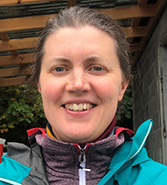 |
|
Evie Fagergren, Administrative Assistant and Bookkeeper
Evie joined PSI in September 2020, where she monitors the contract balances for all of PSI’s various projects, supports administrative tasks, and assists PSI field and lab work. Evie also serves as PSI's bookkeeper, maintaining finacial records and coordinating all payments and invoicing for the organization and its numerous grants and contracts.
Evie earned a BA in Biology from St. Mary’s College of Maryland with a focus in marine sciences. Evie also studied music and teaches private viola lessons in the Olympia community.
When it is low tide, Evie can be found working on her family’s shellfish farm in Totten Inlet harvesting Manila clams, Olympia oysters and Pacific Oysters. |
 |
|
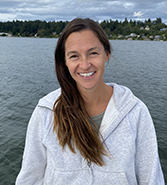 |
|
Mary Elizabeth Bissell, Outreach & Education Manager
Mary Elizabeth holds a B.S. in Marine Biology from San Diego University and a M.S. in Marine Ecology & Fisheries Biology from James Cook University in Queensland, Australia. Mary Elizabeth has over 8 years of experience in Marine Science Education and Outreach. Her interests include education for underserved communities and exposing students to careers in Marine Science.
Prior to working at PSI, Mary Elizabeth worked at the Ocean Institute where she was employed as the Adopt a Class Manager, environmental educator, aquarist, and deckhand aboard the tall ship Spirit of Dana Point. She has also lived in Australia where she performed environmental outreach and collected fish census data on the Great Barrier Reef for Queensland’s Eyes on the Reef program. |
|









